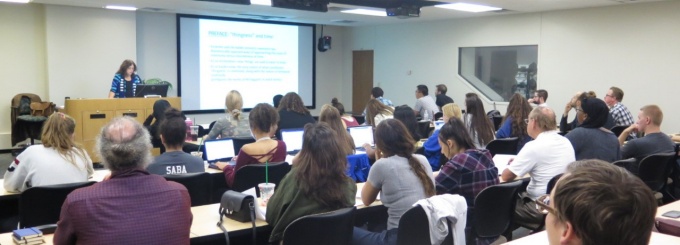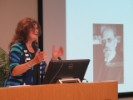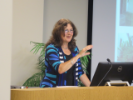- Department of Jewish Thought >
- News & Events >
- Recent News >
- Professor Tamar Rudavsky Visits UB!
"What is Time? A Medieval Debate between Jewish and Islamic Philosophers"
Professor Tamar Rudavsky, of Ohio State, visits UB !
Professor Rudavsky is co-editor with Steven Nadler of the Cambridge History of Jewish Philosophy: From Antiquity through the Seventeenth Century (2009) and author of Time Matters: Time, Creation and Cosmology in Medieval Jewish Philosophy (2000). Her newest book, Jewish Philosophy in the Middle Ages: Science, Rationalism and Religion, is forthcoming with Oxford University Press.

Professor Tamar Rudavsky fills the room full of students and community memebers!
Rudavsky began her argument with a contrast between an Aristotelian conception of time in which things exist in time defined by objective motion, and an occasionalist notion of time that contests temporal unity based on continuous patterns of observation and supposes instead the existence of discrete time atoms created individually by God. Rudavsky takes the Jewish philosopher Moses Maimonides (1135-1204) as her representative for the former, and the Islamic Kalam thinker al-Ghazali (1058-1111) for the latter. A third figure makes up the philosophical network which Rudavsky’s lecture sought to illuminate: Edmund Husserl (1859-1938), whom Rudavsky argued is conceptually linked to al-Ghazali.
Whereas the Aristotelian Maimonides emphasizes the ephemeral now that consists of motion creating time, as a student and innovator of Kalam, al-Ghazali argued that indivisible atoms combine to form extended bodies, but this is not itself an objective time that can be measured because God is re-creating the world atom by atom each instant. Rudavsky sees in al-Ghazali certain commonalities with Husserl that allows her to argue that occasionalism shares with phenomenology a necessity to explain objects in time without recourse to a problematic Aristotelian natural science that ascribes all time to extendedness itself.
Al-Ghazali answers this as a matter of faith—God creates the time units in which we perceive a world, and any rupture in this is a miracle, i.e. a compression of time units—but states that any objective notion of time is harmful to religion because it obfuscates God’s role. He supposes instead that we have habitual mental habits that form a pattern to which God typically adheres out of mercy. This is where a line can be drawn to Husserl, who develops the ideas of retention and anticipatory expectation as a means of explaining how consciousness of the past allows us to expect a certain future, thereby formulating, like al-Ghazali, a notion of time in which identity can be maintained within a body over multiple discrete time units. For both al-Ghazali and Husserl, then, conceptual action is needed to think time, but the religious thinker asserts that in no way does the human bear any responsibility for actually creating time.
Provided by: Ryan Smith







